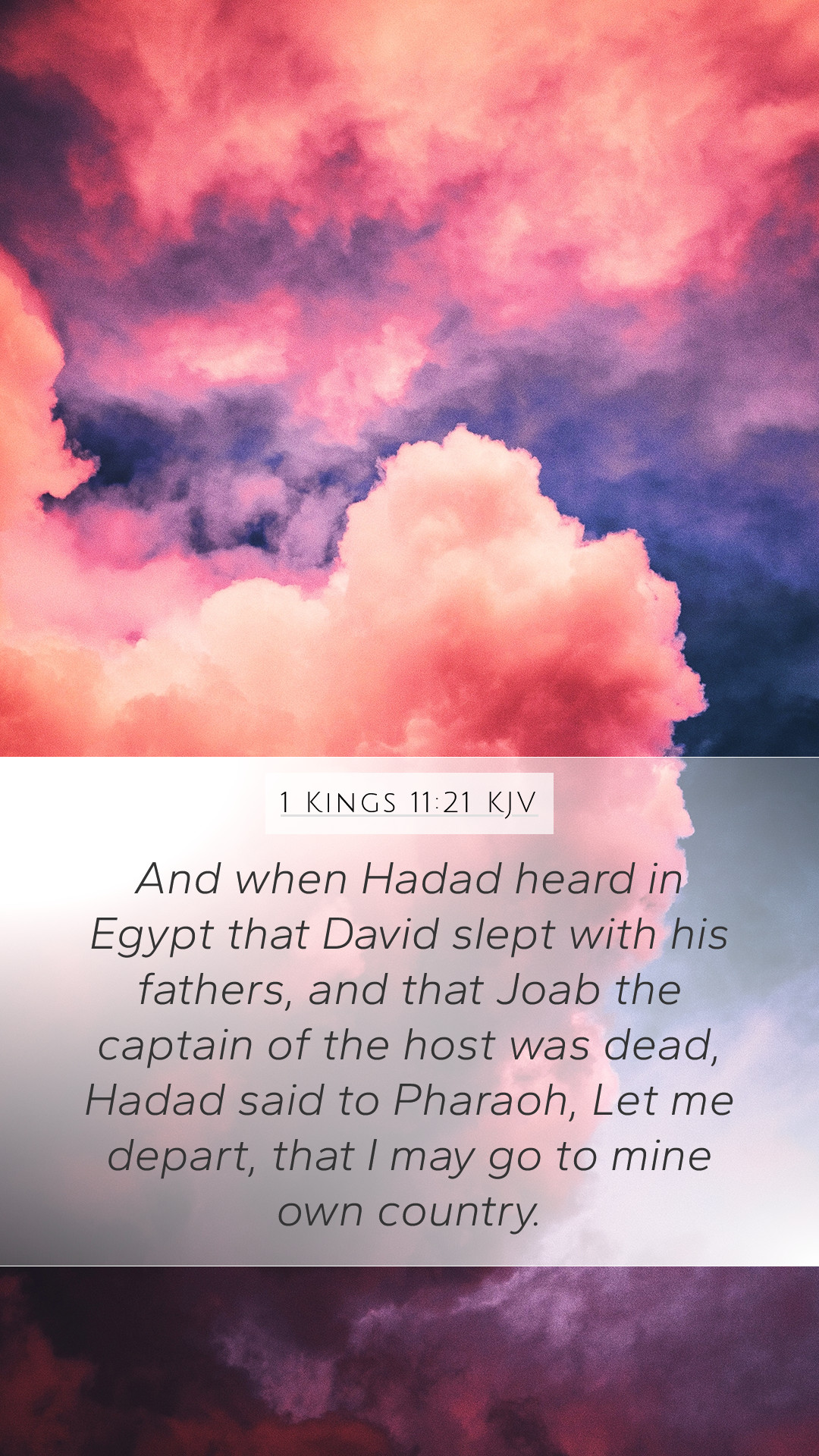Understanding 1 Kings 11:21
Bible Verse: 1 Kings 11:21
Verse: "And when Hadad heard in Egypt that David slept with his fathers, and that Joab the captain of the host was dead, he said unto Pharaoh, Let me go, that I may return into mine own country."
Overview of 1 Kings 11:21
This verse takes place during a crucial period in Israel's history after King David's death and reveals the political dynamics surrounding King Solomon's reign. Hadad, an Edomite royal who had fled to Egypt, learns of the death of David and Joab, suggesting a shift in power and an opportunity for him to return to his homeland.
Insights from Commentaries
-
Matthew Henry's Commentary:
Henry highlights Hadad’s return as a symbol of opposition against Solomon's rule. Hadad, having experienced misfortune, seeks to reclaim his position. This emphasizes God's providence in allowing adversaries to challenge leaders, which can serve as divine warnings or tests for those in power.
-
Albert Barnes's Notes:
Barnes elaborates on Hadad’s motivations, suggesting that his return is not just political but also revengeful. The death of Joab, who was responsible for the death of Hadad's family, leaves a power vacuum that Hadad aims to exploit. This reflects the theme of retribution evident throughout biblical narratives.
-
Adam Clarke's Commentary:
Clarke provides historical context by linking Hadad’s actions to the broader context of Israel's geopolitical struggles. His desire to return illustrates the instability within the region and the continuous social fracturing that marks the days of the kings.
Thematic Analysis
This verse encapsulates themes of power dynamics, vengeance, and the fulfillment of God's sovereignty in the face of human affairs. Hadad’s return is indicative of how personal grievances can drive larger political maneuvers.
Key Themes
- Restoration and Revenge: Hadad’s comeback symbolizes both a personal vendetta and the ongoing cycles of violence that shaped the history of Israel and its neighbors.
- Divine Sovereignty: The events leading to Hadad’s return illustrate the belief that God orchestrates scenarios that fulfill His divine plans for nations and their leaders.
- Political Intrigue: The nature of kingship in ancient Israel often involved competing factions that sought to undermine one another, a recurring motif in biblical stories.
Applications and Reflections
This verse invites readers to reflect on how unresolved conflicts can lead to new challenges and the importance of addressing grievances both personally and politically. It also reminds us of the unpredictable nature of power and how external circumstances can influence one's decisions significantly.
Practical Applications
- Conflict Resolution: Understanding the need for resolution in personal disputes can prevent further escalation.
- Leadership Awareness: Those in positions of power should remain vigilant of potential threats, understanding that peace is often fragile.
- Trust in Providence: Recognizing that God uses various circumstances to fulfill His plans can provide comfort during times of uncertainty.
Cross References
- 1 Kings 1:34 - Anointing of Solomon as king.
- 1 Kings 11:14 - God raising adversaries against Solomon.
- 2 Samuel 8:14 - David's conquests and establishment of peace from enemies.
- Exodus 17:14 - Record of Amalek’s actions to remember their opposition.
- Job 16:11 - Adversity often comes from those who oppose.
Conclusion
1 Kings 11:21 serves as a reminder of the ongoing struggles for power and the consequences of past injustices. For anyone seeking bible verse meanings or bible verse interpretations, this verse highlights the complexities of human nature and divine oversight.
Engaging in bible study groups or utilizing bible study resources can enrich one’s understanding of such narratives, revealing deeper insights into God’s workings throughout history.


